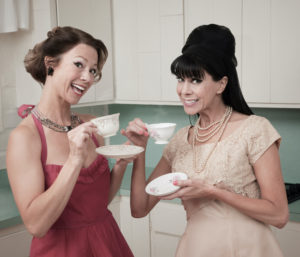Hey Lady
(Circa 2008-2010) At the time, no one in my circle was talking about problematic gendered language and this was my timid attempt to share my thoughts. As I re-read this, I am wincing at my guarded language and feeling that the problem might be me. —sigh—
Ladies. Women. Girls. Babes. Chicks. 
These were the labels plastered on a bathroom door of a local restaurant. My friend and I burst out laughing as we saw it because it coincided with recent chats we’d had about gender labels. This innocent little sign seemed to well represent the confusion that exists as we try to navigate the language surrounding gender.
Hey Lady
For some unknown reason, my friend (a man) calls his female friends “lady”: he answers the phone “hey lady”, or ends with “thanks little lady”. Ughhh…Something about this bothers me and provokes an emotional response that I don’t altogether understand. My agitation led to some interesting conversation about why I am bothered and what, if anything, I would rather be called?
I recently read an article that recommends that not using the term “lady”, claiming it is loaded with expectations. To find out if this is true, I conducted a wholly unscientific survey among my friends to find out how they felt about these gender labels.
For some, it’s a non-issue. Often, the terms “lady” and “girl” are loaded and emotionally explosive. Different levels of offense/non-offense seem to correlate with women’s experiences that produce the images that come to mind as they hear these terms.
Mostly, I found women not wanting to be boxed into a stereotype, wanting instead to define femininity on their own terms.
I Can’t Identify
As I searched for the source of my agitation, I realized the term just doesn’t resonate with me. For example, flipping through the pages of Southern Lady, I find no accurate representation of my friends or myself. Though I totally believe this magazine is a legitimate reflection of part of the female population…it is not me.
Neither could I find myself in the dictionary’s definition, where Webster defines “lady” as a woman of refinement with gentle manners and a woman of superior social position.
Ha. Not me, for sure.
For me, the word is just loaded with prejudice and negative images. These include a “Southern Lady” (with coiffed hair and perfect manners); the “Cafeteria Lady” (with her rough and mannish demeanor); “My Fair Lady” (seeking to be molded by men); “Lady in Waiting” (nothing but a servant); “First Lady” (the woman behind the man ); or the down-on-her-luck “Bag Lady”. In fact, I could think of no term attached to “lady” that felt good to me.
Language Matters
My friend claims no malice or hidden meaning when he calls people “lady”. For him, it’s simply an informal term that connotes friendship and courtesy. And…maybe…I am being way too serious about something pretty silly. But maybe not. Language is sometimes like a minefield, where one one wrong step can make a mess.
If meaning is reality, then the hearer’s reality is just as important as the speaker’s. These terms may not mean anything…or they may mean everything.
The labels on the bathroom door seem to cover all the bases, and it’s as if they are trying to say, “we don’t really know what to call you…so take your pick”!
